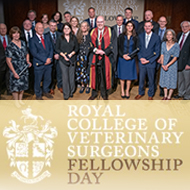
Fellowship awarded in recognition of outstanding contributions to veterinary medicine.
A record number of veterinary surgeons joined the RCVS Fellowship this year, with some 58 out of a total of 65 applicants being admitted.
The RCVS said that, of those joining the Fellowship, 39 have been recognised for meritorious contributions to clinical practice; 14 for meritorious contributions to the profession; and five for meritorious contributions to veterinary knowledge.
Professor John Innes, chair of the Fellowship Board, commented: “The number of new Fellows this year is a real testimony to the depth and breadth of veterinary excellence that the Fellowship draws upon.
“I am delighted to preside over a record number of applicants and our efforts to widen the appeal of the Fellowship and develop a clear strategy and direction of travel for the learned society has clearly paid off. I look forward to formally welcoming them later this year.”
The RCVS Fellowship aims to advance veterinary standards by providing a resource of independent knowledge for the benefit of the veterinary profession. Specifically, it hopes to achieve this aim by promoting scientific excellence, furthering professional skills, and enriching the discourse about the importance of veterinary science to everyone.
Since its re-launch in 2016, more than 200 new Fellows have been admitted, although this year has seen the most new Fellows in a single year.
Dr Mandisa Greene, RCVS President, said: “Many congratulations to all those who joined the RCVS Fellowship this year, it is a fantastic achievement and it can only help to enhance the status of our learned society, the veterinary profession and veterinary science in general.”
The full list of new Fellows is available at www.rcvs.org.uk/fellows
Image (C) RCVS.



 The Animal and Plant Health Agency (APHA) has updated its online reporting service for dead wild birds.
The Animal and Plant Health Agency (APHA) has updated its online reporting service for dead wild birds.